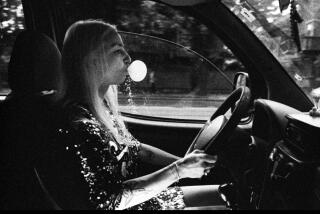Review: Dark comedy ‘Ingrid Goes West’ is a warning to fave-thirsty social media addicts
No film has yet captured both the lure and the psychosis of social media quite like “Ingrid Goes West,” a dark comedy – or is it a warning? — about a lonely soul who seeks connection and finds it, unfortunately for everyone in her orbit, on Instagram.
This is the real “Emoji Movie,” a true horror story for our digital times. In the most acutely relatable ways and built around deft turns by Aubrey Plaza and Elizabeth Olsen, it skewers how we live and lurk these days in timelines fraught with angled sunlit selfies, artisanal avocado toasts and the FOMO-frothing torment of scrolling compulsively through other people’s bliss.
Happiness is all Ingrid Thorburn (Plaza) really wants, after all. We meet her in director Matt Spicer’s feverish opening, eyes crazed and soaked over with tears, maniacally obsessing over picture-perfect posts from a wedding she wasn’t invited to … from her car parked outside the venue.
The burst of frenzied violence that follows sends Ingrid to the psych ward, where motivational posters issue twee promises to the lost and searching: “Believe you can and you are halfway there.” Back home she resumes a drab routine in suburban Pennsylvania, surrounded by reminders of her depressive isolation and a recent loss.
In an early wordless montage, Spicer and Plaza capture all-too-familiar scenes from life in the uniquely 21st century-language of social media, in which the fine line between online connection and manic obsession is dotted with frantic feed refreshes and prayer hands symbols.
“Ingrid Goes West” speaks a dialect of modern human communication familiar to anyone who’s spent days and nights glued to a smartphone, for better and — more often than we realize — for worse. And its anti-heroine is simply leaning into what social culture trumpets into our brains 24/7: You too can find your tribe, live your best life, get #blessed, and thrive, one perfectly composed picture at a time.
But this relatively new double-tap, fave-thirsty existence that connects us to one another, it portends, is also the slipperiest of slopes. (In an age in which many fear that world leaders’ Twitter fingers could actually turn to nuclear trigger fingers, it’s not a terrible idea to pause and reflect on how social media also fuels our worst impulses.)
Ostracized after her recent outburst, Ingrid finds her next obsession in Taylor Sloane (Olsen), a social media “influencer” whose perfect California boho life she reads about in a fashion magazine. Like millions of searching souls before her, she seizes her chance to reinvent herself. Using the $60,000 insurance payout from her mother’s death, she sets out to chase her own American dream: becoming Taylor’s BFF.
Like a child figuring out how to make herself a sandwich for the first time, Ingrid stuffs her inheritance into a backpack and sets out to Los Angeles, landing a westside rental in Venice with vaping, Batman-obsessed aspiring screenwriter landlord Dan (the scene-stealing O’Shea Jackson Jr.).
She copies Taylor’s style, where she shops and what she eats using Taylor’s geo-tagged posts as her guide, then insinuates herself into her girl crush’s life with disturbing ease. Using a little dog-napping to engineer a meet-cute situation, Ingrid quickly becomes Taylor’s new favorite person thanks to their shared love for all the things Taylor likes.
Soon enough the pair are road-tripping to the desert bliss of Joshua Tree, doing coke and dancing at Pappy & Harriet’s and belting K-Ci & Jojo’s “All My Life” — the truest expression of friendship. The film reaches tense heights as we wait for the Jenga pieces of this “Single White Female” for the social media generation to come crashing down.
Spicer and David Branson Smith won the Waldo Salt Screenwriting Award at Sundance for their incisive script, which takes particularly accurate aim at the fetishism of enlightened living that permeates Los Angeles, from the aggressive positivity of Café Gratitude — an easy target — to the Joan Didion-reading, Venice canal-hopping, self-worshipping vanity you’ll recognize from your own social media feeds.
At times we are Ingrid, observing with a cocked eye the silly rituals and carefully curated lives of Taylor and her shaggily charming husband Ezra (Wyatt Russell), a self-declared artist faking his way toward authenticity. “Ingrid” is as brutal to these bohemian posers as it is to its protagonist, who grows increasingly unhinged as a third-act jolt introduces Taylor’s brother Nicky (Billy Magnussen), a fratty playboy who sees through Ingrid and upends her grasp on her own precariously balanced charade.
Plaza shines here in her most multifaceted role to date, fearless in her willingness to take Ingrid to cringe-worthy depths with a chameleonic precision. Ingrid might be a lying, manipulative stalker, but Plaza also lets us see her humanity, engendering a crucial empathy for the desperation that drives her.
The film veers more clumsily as Ingrid wrestles with clear mental health issues, both empowered and enabled by her newfound Insta-power. Its conclusion reminds us Ingrid has darker demons to battle, even if the filmmakers skirt the responsibility of addressing her illness to make the film’s greater point: Ingrid might be a sociopathic selfie-snapping answer to the talented Mr. Ripley, but there’s more of her in us than we’d like to admit.
------------
‘Ingrid Goes West’
Rating: R, for language throughout, drug use, some sexual content and disturbing behavior.
Running time: 1 hour, 37 minutes
Playing: ArcLight Cinemas, Hollywood
More to Read
Only good movies
Get the Indie Focus newsletter, Mark Olsen's weekly guide to the world of cinema.
You may occasionally receive promotional content from the Los Angeles Times.







